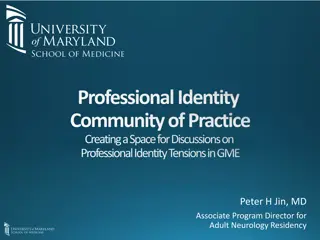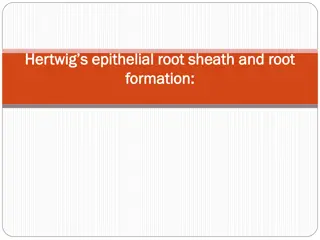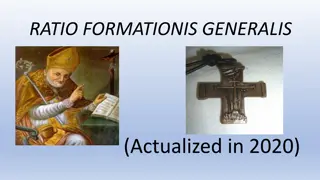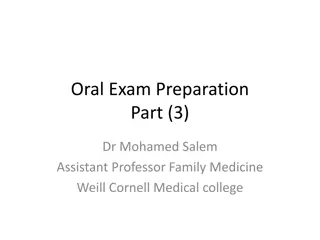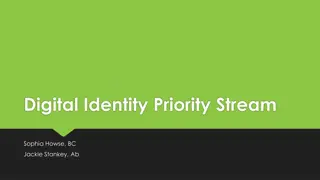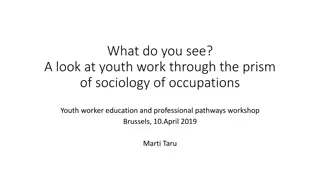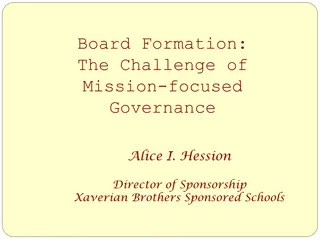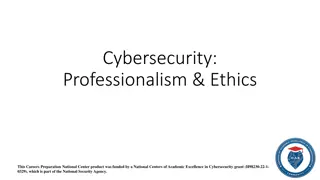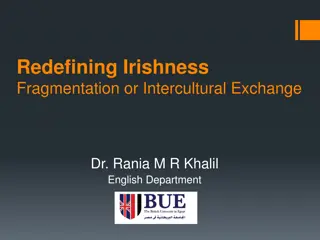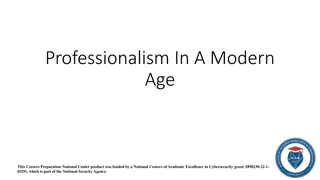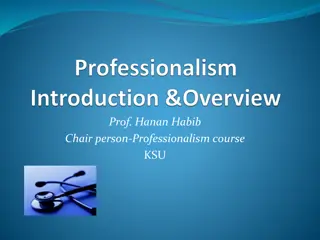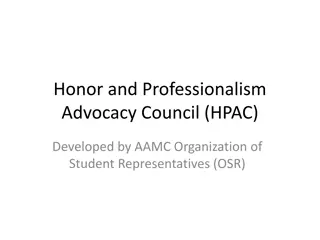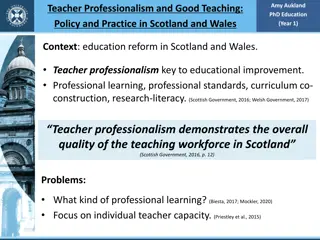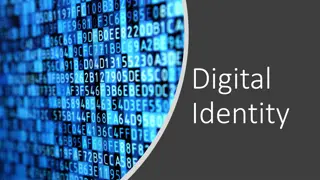Exploring Medical Professionalism and Identity Formation
Delve into the complexities of professionalism in the medical field through discussions on professional identity formation, transformative learning, and the importance of communities of learning. Explore definitions, attributes, and challenges associated with professionalism, presented in the context of medical education and academic medicine. Discover how professional identity is shaped through socialization and engagement with reflective practices.
- Medical professionalism
- Professional identity
- Transformative learning
- Academic medicine
- Community of learning
Download Presentation

Please find below an Image/Link to download the presentation.
The content on the website is provided AS IS for your information and personal use only. It may not be sold, licensed, or shared on other websites without obtaining consent from the author. Download presentation by click this link. If you encounter any issues during the download, it is possible that the publisher has removed the file from their server.
E N D
Presentation Transcript
Attendance and Professionalism UGME Conference, 22 January 2020 Dr Anne Stephenson, Clinical Reader in Medical Education Director of Community Education, Professionalism Lead and Sub-Dean of Student Affairs, GKT School of Medical Education
What is professionalism? Professional Identity Formation Transformative learning Professionalism processes at GKT Attendance Policy at GKT What about attendance? Discussion
What is professionalism? Challenging to define, and the term is used frequently. Two recent definitions: RCP (2018) describes the professional attributes of a doctor in terms of roles: healer; patient partner; team worker; manager & leader; advocate; learner & teacher; and innovator. These aim to help doctors improve their professionalism in practical ways . Shapiro (2018): Professionalism is an umbrella term to define behaviours that support trustworthy relationships. https://www.rcplondon.ac.uk/projects/outputs/advancing-medical-professionalism Shapiro J. Confronting unprofessional behaviour in medicine (Editorial) BMJ 2018;360:k1025
Academic Medicine and Medical Professionalism: Academic Medicine and Medical Professionalism: A Legacy and a Portal Into an Evolving Field of Educational Scholarship A Legacy and a Portal Into an Evolving Field of Educational Scholarship Frederic Hafferty Acad Med. 2017 Sep 5. doi: 10.1097/ACM.0000000000001899. [Epub ahead of print] Hafferty reviews research and key writings on professionalism in medicine and medical education spanning issues of Academic Medicine from 1994 to 2016 Moved on from definition, assessment and institutionalisation individual motives and behaviours to the settings in which they operate Professionalism is more of a journey than a destination best captured not in a definition or metric but in the willingness of a community to engage with itself in an ongoing and reflective search for soul
Professional Identity and Communities of Learning (and attendance) Professional identityis a representation of self, achieved in stages over time, during which the characteristics, values and norms of the medical profession are internalised, resulting in an individual thinking, acting and feeling like a physician . Professional identity formed through process of socialisation where, in a process of legitimate peripheral participation to full participation, the health professional becomes part of a community of learning, a socially configured space[s] that necessarily involve[s] learning as an aspect of membership . Cruess RL, Cruess SR, Boudreau JD, Snell I, Steinert Y. Reframing medical education to support professional identity formation. Acad Med 2014; 89(11):1446-51 Wenger E (1998). Communities of Practice: Learning, Meaning, and Identity. Cambridge, UK: Cambridge University Press. Tummons J (2018). Learning Architectures in Higher Education: Beyond Communities of Practice. London, UK: Bloomsbury Publishing.
The development of the professional identity (and how it relates to attendance) From: Cruess RL, Cruess SR, Steinert Y (2016). Teaching Medical Professionalism. 2nd ed. Cambridge: Cambridge University Press.
Personal and Professional Identity Legitimate Peripheral Participation Existing personal identity Socialisation Full Participation Legitimate Peripheral Participation Full Participation
Supporting the development of the professional identity As educators it is our task to ensure that educational programmes support doctors in training at all levels as they develop their own professional identities . This adds to our previous understanding of professionalism as purely a topic to be taught and assessed. [Students also have responsibility to engage ] Cruess RL, Cruess SR, Steinert Y (2016). Teaching Medical Professionalism. 2nd ed. Cambridge: Cambridge University Press.
Useful concepts & theories Self-directed learning 1970s, e.g. Knowles Learner takes the initiative in diagnosing, formulating, achieving, evaluating learning needs Self-regulated learning 1970s, e.g. Zimmerman Learners have the metacognition skills & motivation to learn as well as the ability to be proactive, self- monitoring & reflective in their learning process Self-efficacy 1970s, e.g. Bandura One s sense of, confidence in being able to deal effectively with a task. Can be helpful or unhelpful. Competency - 1970s, e.g. McGaghie, Albanese The ability to do something successfully & efficiently Entrustable professional activities 2000s, e.g. ten Cate Tasks for which learner attained sufficient specific competence for unsupervised execution Capability 1980s, e.g. Sen
Capability our goal! Self-regulated & self-directed learning & competency Learner uses & integrates competencies in new, complex, non-linear, & changing circumstances, formulating & solving problems in familiar & unfamiliar settings, able to adapt, change, improve performance Values-driven rather than information-driven Patient-centred, team-based & inter-professional Competencies are milestones - capability looks towards excellence Focuses on personal as well as professional development & identifies own aspirations & how they may be realized Promotion of agency & social justice & how to lead a valued life Teacher facilitates, navigates, scaffold & supports progress toward competencies & beyond to accomplish capabilities http://eprints.whiterose.ac.uk/96750/1/C%20Hart%20Capability%20approach%20for%20medical%20education_FINAL_120115-1-1.pdf
Anne Stephenson Attendance Policy at GKT Students are expected to attend all aspects of scheduled teaching and assessment across each year of their programme. As a professional programme satisfactory attendance is essential and appropriate levels of engagement must be demonstrated across all modules as all are core and compulsory in the programme.
Anne Stephenson Attendance Policy at GKT Full attendance is therefore expected throughout all aspects of clinical attachments AND across: All inductions (School and site) Tutorials Workshops Seminars Symposia Clinical skills sessions Dissection Mandatory training sessions Personal Tutor meetings Educational Supervisor meetings
Attendance Policy at GKT Whilst some teaching sessions will have registers it is important to note that much of the scheduled activity will not. As such it is expected that a student will take professional responsibility for notifying the lecturer, module lead, personal tutor, clinical adviser or educational supervisor if they are unable to attend. If this is not possible then contact the relevant Head of Phase/Head of Stage.
Attendance Policy at GKT During placements a request for known absence should be made allowing sufficient time; this is recommended to be a minimum of four weeks in advance. A meeting with the Educational Supervisor should take place to determine and agree how missed learning will be made up. If insufficient notice for the absence is provided or the session cannot be made up, then permission to be absent won t be supported
Attendance Policy at GKT Of course sometimes absence is unavoidable, and should a student be absent for a prolonged period of time due to illness or other personal reason then a medical certificate should be supplied. A prolonged period of absence for a full-time student is a period of one week (seven days) and medical certificates should be sent to the Student Support Manager in the Academic Centre via mbbsstudentsupport@kcl.ac.uk and copied to your Personal Tutor.
Attendance Policy at GKT Repeated absence or significantly long periods of absence may mean that it is not possible for a student to have covered all mandatory learning objectives and in these instances a student will generally meet with the designated lead academic to determine if a plan of additional support can be provided to enable an opportunity to catch up on the missed learning. It is possible that in some instances the absence may be deemed too great and the student may not be able to sit the exams.
Attendance Policy at GKT As each circumstance will be individual to each student it is not possible to determine a fixed percentage of acceptable attendance and any decision taken to provide further learning opportunity or to restrict a student attending examinations would be taken alongside broader consideration of the students overall progression performance throughout the programme. All students must use the mitigating circumstances procedure for notification of examination absence or non-submission/ late submission of coursework/ portfolio submissions.
Professionalism at GKT:identifying, managing and supporting students whose behaviour calls their professionalism into question Transparent and fair process GKT Student Professionalism Policy Low level concerns, (e.g. failure to attend, communicate properly and in a timely manner, and meet deadlines) markers of poor professionalism Online recording system (Student Tracker) tracks low level concerns Multiple reporting of low-level concerns can be flagged and addressed. More serious concerns such as plagiarism, cheating, forging signatures, harassment and bullying, or being untruthful referred directly to senior staff. Separate Medical School and College Fitness to Practice systems for grave professionalism infringements. Confidential GKT Raising Concerns online.
UK experience Attendance discussion notes, UK Council of Teachers of Professionalism, 31 March 2017 Issues Monitoring attendance and engagement Are lectures fit for purpose? Are medical students adult learners? Responsibility to the group to turn up Rules for authorised and unauthorised absence Penalties for lateness versus non-attendance Prefer them to be honest (e.g. slept in) than lie Easy to measure, easy to cheat
UK experience Attendance discussion notes, UK Council of Teachers of Professionalism, 31 March 2017 Electronic attendance systems Random registers On-line register No gaps in the day Make lectures compulsory Get them to do tasks in lectures as part of the register Clinical placement facilitators Specific roles for students so they are useful Poor attendance warning sign of poor professionalism / personal / health problems Transparency about expectations - Tell them why attendance is important Whatever the reason an absence is an absence Pick up on a certain number of authorised absences Implement attendance policy Feed into ranking after a certain number unauthorised attendances
How can we improve attendance? A whole UK problem and no real satisfactory answers as yet Why are students not turning up? We want the students to understand the importance of engaging Carrots and sticks not working Large numbers of students and large complex programme Meet with MSA and talk through solutions Something we may be able to improve using e-portfolio




